Change people’s lives with a career in health
If you’re starting to think about your future career and you have a passion for helping people, you’ve come to the right place.
Here you can explore a range of exciting, challenging, and impactful careers within the world of health care that can significantly improve patients’ quality of life. Each one offers many opportunities to make a real difference to people’s health and wellbeing in ways you may never have imagined.
Have you considered a career in health?
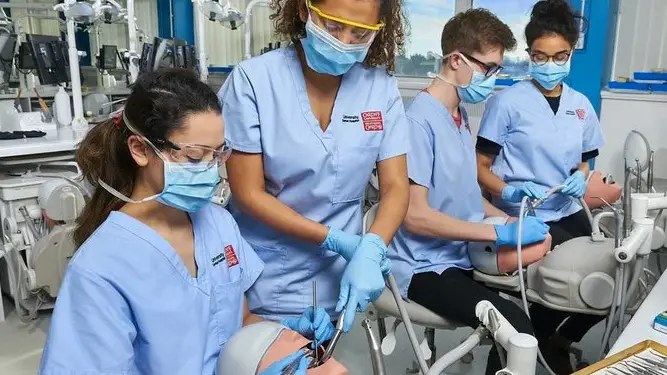
Be a Dentist
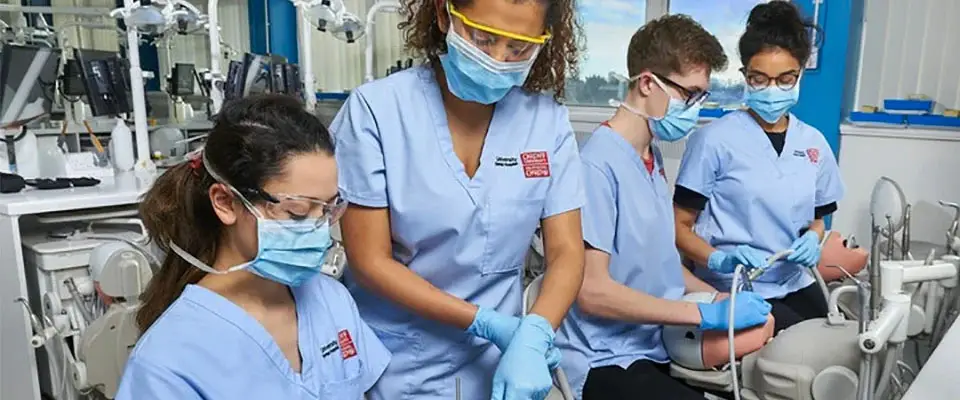
The role of a dentist
Dentists (also known as dental surgeons) are trained professionals who help care for the teeth and the mouth. Their work is increasingly about protecting teeth and preventing gums from decay and disease.
Dentists have excellent knowledge of human anatomy and oral diseases as they work with patients of all ages – from children to the elderly – to prevent and treat dental and oral disease, correct dental irregularities and treat dental and facial injuries. They also help to diagnose more serious issues, such as mouth cancers. It’s important for Dentists to have high levels of manual dexterity and clinical skills to carry out intricate surgical and dental procedures.
Not only do dentists have the skills and confidence to diagnose and treat problems and provide good advice to the general public, they are also good team leaders as they lead the wider dental team comprising of dental therapists and hygienists.
Dentists are likely to work in your local community but they also have the chance to work in a variety of areas such as; general dental care, community dental care, dental public health, hospital dental care and in the armed forces. Some dentists focus more on benefiting public health and, through laboratory work and research, they discover new ways to help keep the public’s teeth and mouths healthy.
Being a dentist really can help people. A filling can help to remove pain; a denture may help people eat foods they may previously have struggled with; teeth whitening or orthodontics can help people feel more confident. This, in turn, improves people’s quality of life.
The first step towards becoming a dentist is studying dentistry. So, if you love science – especially human anatomy – and enjoy being able to solve problems and help people, this could be the perfect career for you!
Study dentistry at Cardiff University
Find out more about studying Dentistry at Cardiff University
Find out more about applying to study Dentistry or Dental Hygiene by downloading our Passport to Dentistry which is full of useful information.
Be a Dentist

The role of a dentist
Dentists (also known as dental surgeons) are trained professionals who help care for the teeth and the mouth. Their work is increasingly about protecting teeth and preventing gums from decay and disease.
Dentists have excellent knowledge of human anatomy and oral diseases as they work with patients of all ages – from children to the elderly – to prevent and treat dental and oral disease, correct dental irregularities and treat dental and facial injuries. They also help to diagnose more serious issues, such as mouth cancers. It’s important for Dentists to have high levels of manual dexterity and clinical skills to carry out intricate surgical and dental procedures.
Not only do dentists have the skills and confidence to diagnose and treat problems and provide good advice to the general public, they are also good team leaders as they lead the wider dental team comprising of dental therapists and hygienists.
Dentists are likely to work in your local community but they also have the chance to work in a variety of areas such as; general dental care, community dental care, dental public health, hospital dental care and in the armed forces. Some dentists focus more on benefiting public health and, through laboratory work and research, they discover new ways to help keep the public’s teeth and mouths healthy.
Being a dentist really can help people. A filling can help to remove pain; a denture may help people eat foods they may previously have struggled with; teeth whitening or orthodontics can help people feel more confident. This, in turn, improves people’s quality of life.
The first step towards becoming a dentist is studying dentistry. So, if you love science – especially human anatomy – and enjoy being able to solve problems and help people, this could be the perfect career for you!
Study dentistry at Cardiff University
Find out more about studying Dentistry at Cardiff University
Find out more about applying to study Dentistry or Dental Hygiene by downloading our Passport to Dentistry which is full of useful information.
Dentists (also known as dental surgeons) are trained professionals who help care for patients’ teeth and mouth. Their work is increasingly about protecting teeth and preventing gums from decay and disease.
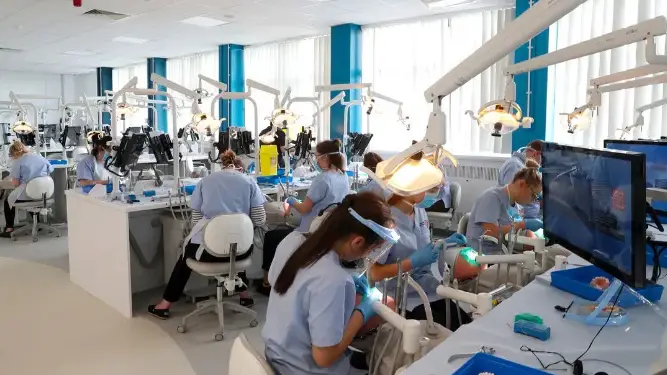
Be a Dental therapist or Hygienist
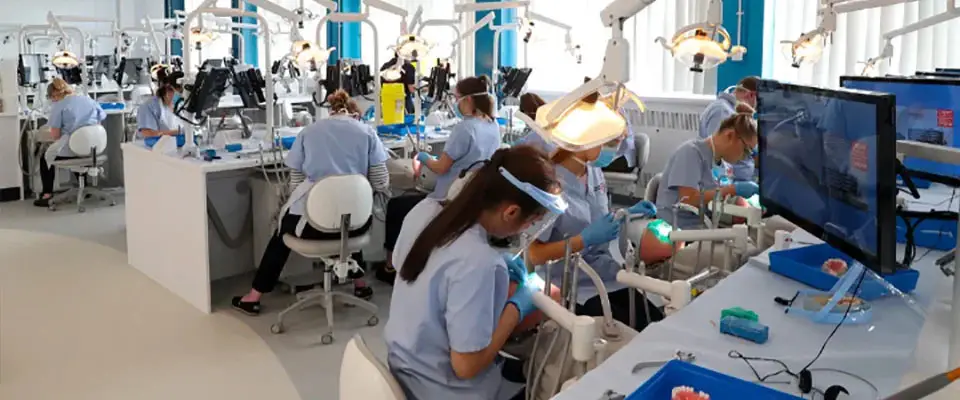
The role of a Dental therapist or Hygienist
Prevention is always better than treatment which is why dental hygienists play such an important role in oral health.
In comparison to a dentist, the dental hygienist is the expert who will evaluate your oral health and apply preventive treatment. They help children and adults look after their teeth and gums, sometimes working on a one-to-one basis, and sometimes they work with groups of people.
A dental hygienist can carry out treatments, such as scaling and polishing, and preventative fissure sealants for members of the public as well as implementing oral health promotion. In addition, dental therapists are able to carry out a variety of restorative treatments (fillings) on patients. They may also extract deciduous (baby) teeth, undertake pulpotomies (nerve treatments) and place preformed crowns on badly decayed children’s teeth.
Dental hygienists and therapists work closely with other members of the dental team since the dentist will usually advise dental hygienists and therapists to help direct their work, although it’s now possible for hygienists and therapists who have extra training to set up their own practices or work independently.
To practise as a dental hygienist and therapist you’ll need an interest in anatomy and physiology and you’ll learn more about preventative dentistry and dental health education with the care of patients at its heart.
Study dentistry at Cardiff University
Find out more about studying Dentistry at Cardiff University
Find out more about applying to study Dentistry or Dental Hygiene by downloading our Passport to Dentistry which is full of useful information.
Be a Dental therapist or hygienist

The role of a Dental therapist or Hygienist
Prevention is always better than treatment which is why dental hygienists play such an important role in oral health.
In comparison to a dentist, the dental hygienist is the expert who will evaluate your oral health and apply preventive treatment. They help children and adults look after their teeth and gums, sometimes working on a one-to-one basis, and sometimes they work with groups of people.
A dental hygienist can carry out treatments, such as scaling and polishing, and preventative fissure sealants for members of the public as well as implementing oral health promotion. In addition, dental therapists are able to carry out a variety of restorative treatments (fillings) on patients. They may also extract deciduous (baby) teeth, undertake pulpotomies (nerve treatments) and place preformed crowns on badly decayed children’s teeth.
Dental hygienists and therapists work closely with other members of the dental team since the dentist will usually advise dental hygienists and therapists to help direct their work, although it’s now possible for hygienists and therapists who have extra training to set up their own practices or work independently.
To practise as a dental hygienist and therapist you’ll need an interest in anatomy and physiology and you’ll learn more about preventative dentistry and dental health education with the care of patients at its heart.
Study dentistry at Cardiff University
Find out more about studying Dentistry at Cardiff University
Find out more about applying to study Dentistry or Dental Hygiene by downloading our Passport to Dentistry which is full of useful information.
Prevention is always better than cure, which is why dental hygienists play such an important role in promoting and protecting oral health.
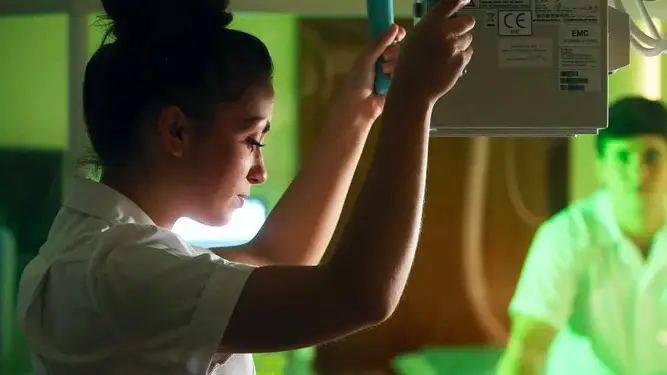
Be a Diagnostic radiographer
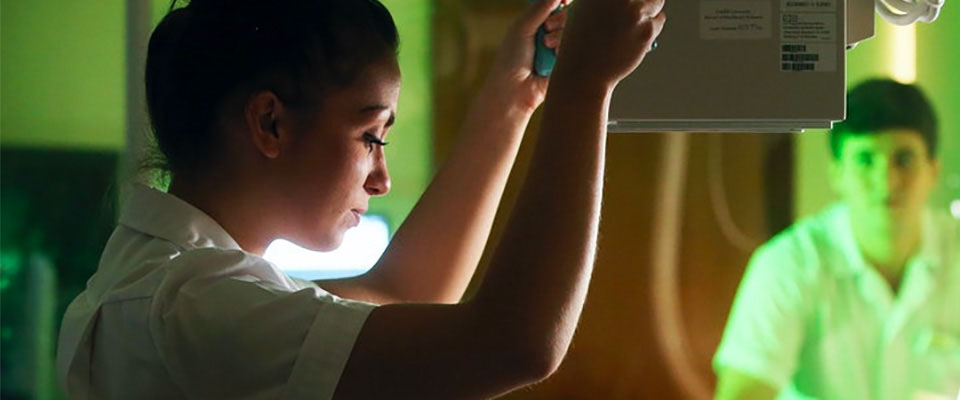
The role of a Diagnostic radiographer
Diagnostic radiographers use a range of technology to take images and look inside a patient’s body to identify any illness, injury, or disease, so that the patient can receive the correct treatment. Diagnostic radiographers perform different radiographic examinations on patients to produce high-quality images; take responsibility for radiation safety; help in more complex radiological examinations by working with doctors such as radiologists and surgeons; and they can be involved in research. With experience, they can contribute towards interpreting images, establish treatment plans and help with intervention procedures, for example the removal of kidney stones.
Diagnostic radiographers are also responsible for the use and upkeep of highly technical equipment. They work with X-rays, CT scans, MRIs, or ultrasounds in a variety of high-stress places, from operating theatres and Accident & Emergency departments to mobile units. It is their duty to ensure this equipment is in correct working order, as well as being confident in using these machines to treat patients.
If you like technology and would like to work as part of a multi-disciplinary team across various departments and with a variety of patients, this could be your career of choice. In a role as varied and exciting as this, no two days will be the same. Are you up for the challenge?
Study diagnostic radiography at Cardiff University
*as an institution offering Diagnostic Radiography and Imaging under the category of Medical Technology
Discover more about studying radiography at Cardiff University
Be a Diagnostic radiographer

The role of a Diagnostic radiographer
Diagnostic radiographers use a range of technology to take images and look inside a patient’s body to identify any illness, injury, or disease, so that the patient can receive the correct treatment. Diagnostic radiographers perform different radiographic examinations on patients to produce high-quality images; take responsibility for radiation safety; help in more complex radiological examinations by working with doctors such as radiologists and surgeons; and they can be involved in research. With experience, they can contribute towards interpreting images, establish treatment plans and help with intervention procedures, for example the removal of kidney stones.
Diagnostic radiographers are also responsible for the use and upkeep of highly technical equipment. They work with X-rays, CT scans, MRIs, or ultrasounds in a variety of high-stress places, from operating theatres and Accident & Emergency departments to mobile units. It is their duty to ensure this equipment is in correct working order, as well as being confident in using these machines to treat patients.
If you like technology and would like to work as part of a multi-disciplinary team across various departments and with a variety of patients, this could be your career of choice. In a role as varied and exciting as this, no two days will be the same. Are you up for the challenge?
Study diagnostic radiography at Cardiff University
*as an institution offering Diagnostic Radiography and Imaging under the category of Medical Technology
Discover more about studying radiography at Cardiff University
Using a blend of science, innovative technology and problem-solving skills, diagnostic radiographers are needed to help diagnose patients and improve patient care.
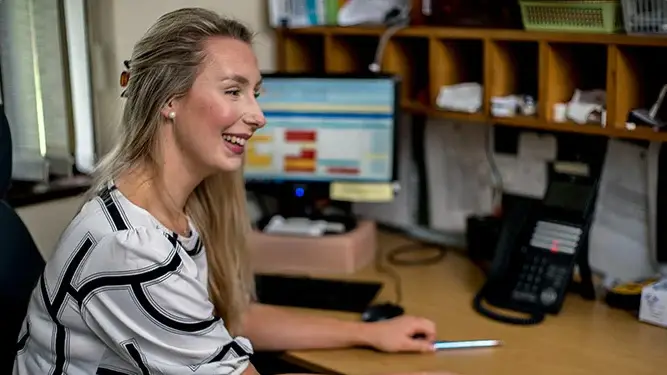
Be a Doctor

The role of a Doctor
Some doctors enter General Practice where they will provide care for their patients who seek medical advice for all sorts of mental and physical health concerns in community doctors’ surgeries. Other doctors will specialise in a particular medical discipline and will see patients who have been referred to them for specialist consultations and treatment.
What all doctors have in common are the core duties of listening carefully to patients to gain an understanding of their symptoms, diagnosing conditions that cause the patients’ symptoms, reading and interpreting medical tests and lab results, prescribing medication and administering treatments, ordering tests and procedures (sometimes performing medical procedures themselves), providing follow-up care for patients before discharging them from their care, referring patients to other healthcare providers, working extremely closely with a whole range of healthcare professionals including other doctors, nurses, pharmacists and more.
It’s also imperative that doctors keep on top of new medical research and guidelines, adapting their care as new findings, new medicines and new technologies emerge.
Given that doctors are required to provide care for people from many backgrounds, as well as working in conjunction with a big team of professionals at all stages of their careers, good communication skills are essential. They need to be able to convey complex medical information and treatment plans in a way that patients can understand and also consider the ethical issues around every aspect of their medical practice.
If you want to help patients overcome their physical and mental health problems to improve their quality of life, you may want to consider a career as a medical doctor.
The first step towards becoming a doctor is studying medicine. To find out more about applying to study Medicine, download our ‘Passport to Medicine’ which is jam-packed with useful information, hints and tips to help you on your way.
Study medicine at Cardiff University
Be a Dentist

The role of a Doctor
Some doctors enter General Practice where they will provide care for their patients who seek medical advice for all sorts of mental and physical health concerns in community doctors’ surgeries. Other doctors will specialise in a particular medical discipline and will see patients who have been referred to them for specialist consultations and treatment.
What all doctors have in common are the core duties of listening carefully to patients to gain an understanding of their symptoms, diagnosing conditions that cause the patients’ symptoms, reading and interpreting medical tests and lab results, prescribing medication and administering treatments, ordering tests and procedures (sometimes performing medical procedures themselves), providing follow-up care for patients before discharging them from their care, referring patients to other healthcare providers, working extremely closely with a whole range of healthcare professionals including other doctors, nurses, pharmacists and more.
It’s also imperative that doctors keep on top of new medical research and guidelines, adapting their care as new findings, new medicines and new technologies emerge.
Given that doctors are required to provide care for people from many backgrounds, as well as working in conjunction with a big team of professionals at all stages of their careers, good communication skills are essential. They need to be able to convey complex medical information and treatment plans in a way that patients can understand and also consider the ethical issues around every aspect of their medical practice.
If you want to help patients overcome their physical and mental health problems to improve their quality of life, you may want to consider a career as a medical doctor.
The first step towards becoming a doctor is studying medicine. To find out more about applying to study Medicine, download our ‘Passport to Medicine’ which is jam-packed with useful information, hints and tips to help you on your way.
Study medicine at Cardiff University
Doctors have a very wide range of responsibilities including holding consultations with patients, diagnosing conditions and treating their patients to improve their health and quality of life.
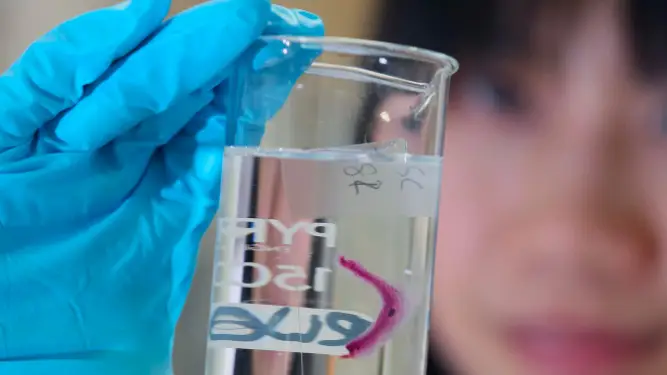
Be an Epidemiologist

The role of an Epidemiologist
You might have heard about Epidemiologists in the news as they have played an important role in the COVID-19 pandemic. Epidemiologists study the causes, effects and patterns of diseases in groups of people, rather than individuals.
Finding out where a disease has come from, how it is transmitted, and how to stop it being passed on is a really important part of managing epidemics (outbreaks of disease) and preventing them from happening. When they have this information, governments, health officials and doctors are able to advise the public on how to protect themselves and develop and provide the right treatments.
Epidemiologists collect lots of information about diseases in a population as well as conducting surveys and studying samples, often comparing healthy and unhealthy people. They analyse this data, and their findings are used in public health policies and global health strategies to manage and try to prevent future epidemics.
Most Epidemiologists work in research, looking at the causes and patterns of diseases in communities by using statistics and computer modelling. But it is also possible to work with patients, studying how the disease has developed in individuals, by becoming a medically-qualified Epidemiologist or Clinical Scientist working in infection science.
Study epidemiology at Cardiff University
Find out more about studying epidemiology at Cardiff University
Be an Epidemiologist

The role of an Epidemiologist
You might have heard about Epidemiologists in the news as they have played an important role in the COVID-19 pandemic. Epidemiologists study the causes, effects and patterns of diseases in groups of people, rather than individuals.
Finding out where a disease has come from, how it is transmitted, and how to stop it being passed on is a really important part of managing epidemics (outbreaks of disease) and preventing them from happening. When they have this information, governments, health officials and doctors are able to advise the public on how to protect themselves and develop and provide the right treatments.
Epidemiologists collect lots of information about diseases in a population as well as conducting surveys and studying samples, often comparing healthy and unhealthy people. They analyse this data, and their findings are used in public health policies and global health strategies to manage and try to prevent future epidemics.
Most Epidemiologists work in research, looking at the causes and patterns of diseases in communities by using statistics and computer modelling. But it is also possible to work with patients, studying how the disease has developed in individuals, by becoming a medically-qualified Epidemiologist or Clinical Scientist working in infection science.
Study epidemiology at Cardiff University
Find out more about studying epidemiology at Cardiff University
If you are fascinated by the causes, effects and patterns of diseases in groups of people, rather than individuals, you might love a career as an epidemiologist.
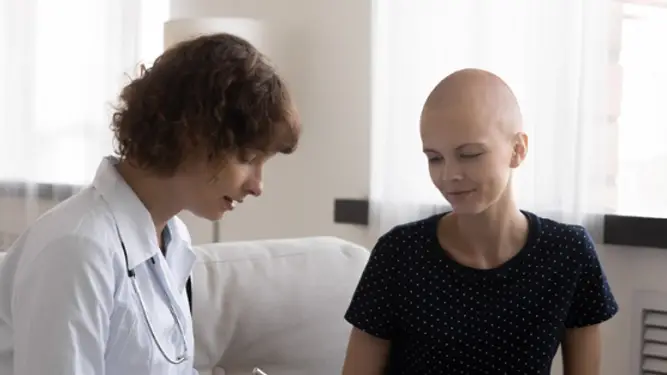
Be a Medical oncologist

The role of a Medical oncologist
When a patient is suspected of having cancer, they will be referred to an oncology team who will work to diagnose the problem. If cancer is discovered through the tests that they run, the medical oncology team will discuss the treatment options available with the patient, and support them throughout their care and beyond.
The medical oncologist will look at all the evidence and tests carried out on the patient to work out what the best approach is for that patient, and what the intended outcome is – whether that’s a cure, or to extend the amount of time that patient has left to live a good quality life. Medical oncology teams often work hand-in-hand with clinical oncology teams – clinical oncologists are responsible for the application of radiotherapy and chemotherapy, and medical oncologists will often arrange and supervise these drug treatments and therapies (only clinical oncologists deliver radiotherapy).
Many people in this role develop special interests in different types of cancer (such as cancers of the female reproductive system, or gastrointestinal tract cancers) or areas like paediatric oncology or palliative care (care and treatment of patients whose cancer cannot be cured).
Clinical research is a very important part of a medical oncologist’s role. As a medical oncologist, you could expect to run and manage clinical care of patients as well as clinical trials and lab work. New treatments and discoveries are being made all the time so this is a career that’s suited to those who enjoy constantly learning new things and can handle staying up-to-date with all the advancements and developments in the field.
Oncology is a multidisciplinary area, which means working as part of a bigger team of people to deliver care to individual patients. This includes working alongside a wide range of nurses, doctors and other specialists, all of whom are focused on delivering the best possible outcomes. Working well as part of a team, leadership skills and great communication skills are key elements of this role.
It goes without saying that oncology is a sensitive and difficult area of medicine. Patients may have very poor prospects and many of the treatments available to hopefully cure the disease or prolong quality of life can be painful and difficult to tolerate. It can be a very emotional job and requires a high degree of empathy and sensitivity from those who choose to specialise in it.
If you have a calm and reassuring manner, are precise under pressure, and can handle a role that involves communicating complex information to patients who may be distressed, then this may be the career for you.
The first step towards becoming a medical oncologist is studying medicine. To find out more about applying to study Medicine, download our ‘Passport to Medicine’ which is jam-packed with useful information, hints and tips to help you on your way.
Study medicine at Cardiff University
Be a Medical oncologist

The role of a Medical oncologist
When a patient is suspected of having cancer, they will be referred to an oncology team who will work to diagnose the problem. If cancer is discovered through the tests that they run, the medical oncology team will discuss the treatment options available with the patient, and support them throughout their care and beyond.
The medical oncologist will look at all the evidence and tests carried out on the patient to work out what the best approach is for that patient, and what the intended outcome is – whether that’s a cure, or to extend the amount of time that patient has left to live a good quality life. Medical oncology teams often work hand-in-hand with clinical oncology teams – clinical oncologists are responsible for the application of radiotherapy and chemotherapy, and medical oncologists will often arrange and supervise these drug treatments and therapies (only clinical oncologists deliver radiotherapy).
Many people in this role develop special interests in different types of cancer (such as cancers of the female reproductive system, or gastrointestinal tract cancers) or areas like paediatric oncology or palliative care (care and treatment of patients whose cancer cannot be cured).
Clinical research is a very important part of a medical oncologist’s role. As a medical oncologist, you could expect to run and manage clinical care of patients as well as clinical trials and lab work. New treatments and discoveries are being made all the time so this is a career that’s suited to those who enjoy constantly learning new things and can handle staying up-to-date with all the advancements and developments in the field.
Oncology is a multidisciplinary area, which means working as part of a bigger team of people to deliver care to individual patients. This includes working alongside a wide range of nurses, doctors and other specialists, all of whom are focused on delivering the best possible outcomes. Working well as part of a team, leadership skills and great communication skills are key elements of this role.
It goes without saying that oncology is a sensitive and difficult area of medicine. Patients may have very poor prospects and many of the treatments available to hopefully cure the disease or prolong quality of life can be painful and difficult to tolerate. It can be a very emotional job and requires a high degree of empathy and sensitivity from those who choose to specialise in it.
If you have a calm and reassuring manner, are precise under pressure, and can handle a role that involves communicating complex information to patients who may be distressed, then this may be the career for you.
The first step towards becoming a medical oncologist is studying medicine. To find out more about applying to study Medicine, download our ‘Passport to Medicine’ which is jam-packed with useful information, hints and tips to help you on your way.
Study medicine at Cardiff University
An oncologist is a doctor who diagnoses, assesses, treats and manages patients with cancers. They aim to provide the best possible outcomes for each individual patient.

Be a Midwife

The role of a Midwife
The original meaning of Midwife is to be ‘with woman’ and this is true of the role of the midwife for pregnant women.
A midwife has a very demanding and unique role in preparing women for the delivery of their baby (or babies). A qualified midwife provides full antenatal care – monitoring all pregnant women and supporting them during labour. They also teach new mothers how to care for their babies. This extends to providing home visits, breast-feeding support and education, and support if the new mother is experiencing post-natal depression. Midwives often work in partnership with other health and social care services to meet each individual mother’s needs.
Midwives are experts on childbirth and have a diverse set of responsibilities. Women can be nervous about giving birth or may have had difficult birth experiences in the past and a midwife needs to be prepared for when pregnancy or childbirth doesn’t go to plan. They support women from all walks of life, including those who may need an extra hand, for example women who have experienced domestic abuse or mental health problems, teenage mothers, mothers who are socially excluded, who are disabled or who are from diverse ethnic backgrounds. Midwives need to be confident communicating and supporting different people in a variety of situations, giving lots of consideration to their specific needs and circumstances.
Midwives operate in many settings, including hospital maternity units, birth centres, midwifery group practices, community health centres and in private homes. Some also go into research roles to improve the health of the wider public.
It can be pretty demanding but also hugely rewarding to help women at an important time in their lives. So, if you’re a good listener, caring, encouraging and keep calm under pressure, you could have just the right traits to perfectly suit this career path.
Study midwifery at Cardiff University
Discover more about studying midwifery at Cardiff University
Be a Midwife

The role of a Midwife
The original meaning of Midwife is to be ‘with woman’ and this is true of the role of the midwife for pregnant women.
A midwife has a very demanding and unique role in preparing women for the delivery of their baby (or babies). A qualified midwife provides full antenatal care – monitoring all pregnant women and supporting them during labour. They also teach new mothers how to care for their babies. This extends to providing home visits, breast-feeding support and education, and support if the new mother is experiencing post-natal depression. Midwives often work in partnership with other health and social care services to meet each individual mother’s needs.
Midwives are experts on childbirth and have a diverse set of responsibilities. Women can be nervous about giving birth or may have had difficult birth experiences in the past and a midwife needs to be prepared for when pregnancy or childbirth doesn’t go to plan. They support women from all walks of life, including those who may need an extra hand, for example women who have experienced domestic abuse or mental health problems, teenage mothers, mothers who are socially excluded, who are disabled or who are from diverse ethnic backgrounds. Midwives need to be confident communicating and supporting different people in a variety of situations, giving lots of consideration to their specific needs and circumstances.
Midwives operate in many settings, including hospital maternity units, birth centres, midwifery group practices, community health centres and in private homes. Some also go into research roles to improve the health of the wider public.
It can be pretty demanding but also hugely rewarding to help women at an important time in their lives. So, if you’re a good listener, caring, encouraging and keep calm under pressure, you could have just the right traits to perfectly suit this career path.
Study midwifery at Cardiff University
Discover more about studying midwifery at Cardiff University
Being a midwife is unique role and is a vital support for women and their babies during all stages of pregnancy, labour, and the early postnatal period.
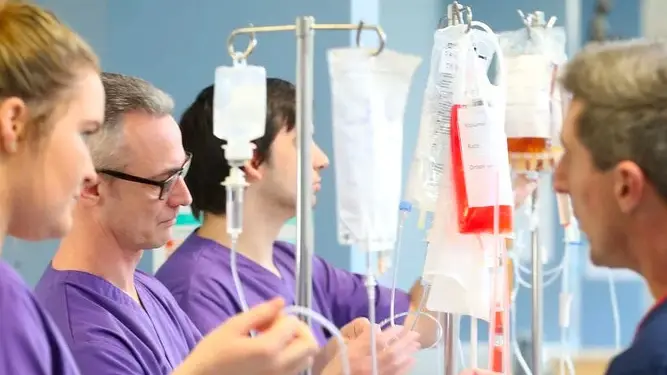
Be a Nurse
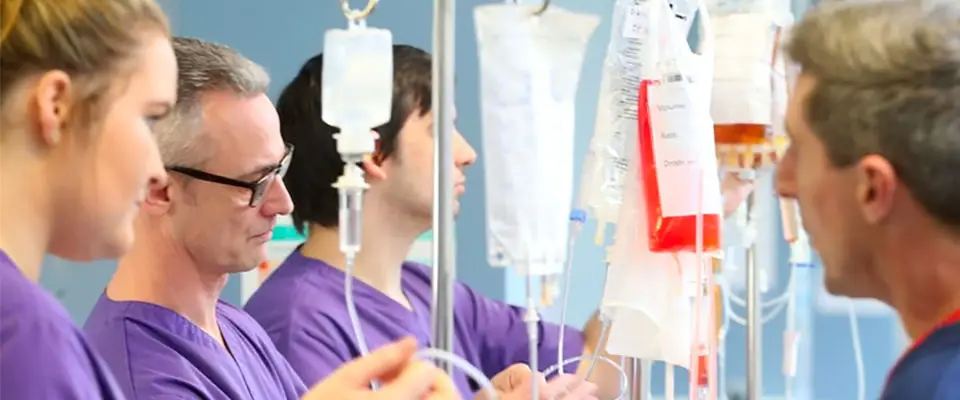
The role of a Nurse
Simply put, nurses help to save lives.
They make up over half of the healthcare workforce, work directly with patients, and are part of a diverse team of doctors and health professionals with all kinds of backgrounds from all over the world.
Nurses help in the care of individuals of all ages, families, groups, and communities and in all kinds of settings. The role of a nurse is far reaching and includes the promotion of health, the prevention of illness, and the care of ill, disabled and dying people. From providing vaccinations before a trip abroad to treating and caring for patients after a serious operation, there are many kinds of nurse with different specialities which opens up a world of opportunity, some of the areas include; the Adult Nurse, the Mental Health Nurse and the Children’s Nurse.
Adult nurses
Of all nursing roles, adult nurses work with the widest variety of patients over the age of eighteen, from any background, who may be experiencing all kinds of short or long-term health problems. So, to be an adult nurse, you need to be very adaptable, resilient, maintain strong problem-solving skills, and communicate well with all sorts of people.
Mental health nurses
A mental health nurse offers help and support to people of all ages who experience mental illness, their families, and carers. Whilst a key role of the mental health nurse is to form relationships between the patient and their therapists, it is important that you are also able to use effective communication strategies to demonstrate compassionate, creative, and critical mental health care that focuses on recovery.
Children’s nurses
Children’s nurses provide support and deliver multi-disciplinary care to children, adolescents, and their families. The role can involve everything from nursing a sick new-born baby to caring for a young person following a road traffic accident. A children’s nurse needs to interpret children’s behaviour and reactions and be able to spot when a child’s health deteriorates, which can happen rapidly.
Nursing is an extremely diverse job and a typical day for one nurse can be completely different to another. It means you have the opportunity to take your nursing career in many different directions. If you want an adventure every day with the added bonus of helping people, why not explore nursing?
Study nursing at Cardiff University
Discover more about studying adult nursing at Cardiff University
Discover more about studying mental health nursing at Cardiff University
Discover more about studying child nursing at Cardiff University
Be a Nurse

The role of a Nurse
Simply put, nurses help to save lives.
They make up over half of the healthcare workforce, work directly with patients, and are part of a diverse team of doctors and health professionals with all kinds of backgrounds from all over the world.
Nurses help in the care of individuals of all ages, families, groups, and communities and in all kinds of settings. The role of a nurse is far reaching and includes the promotion of health, the prevention of illness, and the care of ill, disabled and dying people. From providing vaccinations before a trip abroad to treating and caring for patients after a serious operation, there are many kinds of nurse with different specialities which opens up a world of opportunity, some of the areas include; the Adult Nurse, the Mental Health Nurse and the Children’s Nurse.
Adult nurses
Of all nursing roles, adult nurses work with the widest variety of patients over the age of eighteen, from any background, who may be experiencing all kinds of short or long-term health problems. So, to be an adult nurse, you need to be very adaptable, resilient, maintain strong problem-solving skills, and communicate well with all sorts of people.
Mental health nurses
A mental health nurse offers help and support to people of all ages who experience mental illness, their families, and carers. Whilst a key role of the mental health nurse is to form relationships between the patient and their therapists, it is important that you are also able to use effective communication strategies to demonstrate compassionate, creative, and critical mental health care that focuses on recovery.
Children’s nurses
Children’s nurses provide support and deliver multi-disciplinary care to children, adolescents, and their families. The role can involve everything from nursing a sick new-born baby to caring for a young person following a road traffic accident. A children’s nurse needs to interpret children’s behaviour and reactions and be able to spot when a child’s health deteriorates, which can happen rapidly.
Nursing is an extremely diverse job and a typical day for one nurse can be completely different to another. It means you have the opportunity to take your nursing career in many different directions. If you want an adventure every day with the added bonus of helping people, why not explore nursing?
Study nursing at Cardiff University
Discover more about studying adult nursing at Cardiff University
Discover more about studying mental health nursing at Cardiff University
Discover more about studying child nursing at Cardiff University
There are many kinds of nurse with different specialities which opens up a world of opportunity, including adult nurse, mental health nurse and the children’s nurse.
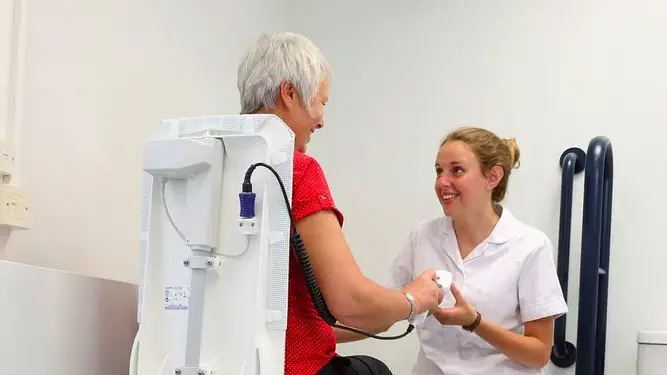
Be an Occupational therapist
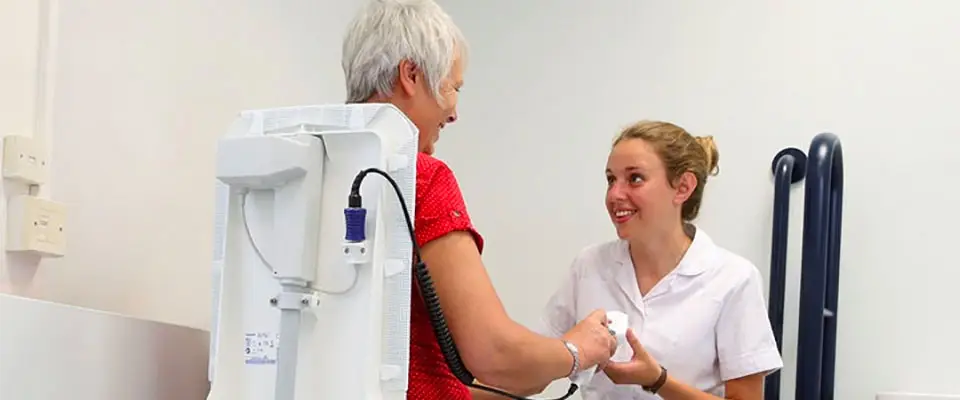
The role of an Occupational therapist
Occupational therapists support people whose health problems, caused by illness, ageing or accident, prevent them from completing tasks and activities that matter to them.
Occupational therapists can identify a patient’s difficulties in everyday life, such as dressing or getting to the shops, and will help them to work out practical solutions. They work with their patients to identify goals that can help to maintain, regain, or improve their independence by using different techniques, changing their environment, and using new equipment. For example, after a having hip replacement, a person may find it difficult to get in and out of the bath – an occupational therapist will work with them to find the best solution.
Occupational therapists work with those who have difficulties due to a mental health illness as well as physical or learning disabilities. They can work in a variety of settings including hospitals, social care services, housing, education, voluntary organisations or act as independent practitioners.
An occupational therapist will consider all of the patient’s needs – physical, psychological, social, and environmental. The support they offer can make a real difference, giving people a renewed sense of purpose and it can change the way patients feel about their entire future.
This is an ever-developing role with new opportunities emerging outside of the traditional settings, including working with refugees or with the Fire and Police services. It is also diverse and extremely rewarding so, if you want to work closely with patients to help them in their everyday lives, you could become a brilliant occupational therapist.
Study occupational therapy at Cardiff University
Discover more about studying occupational therapy at Cardiff University
Be an Occupational therapist

The role of an Occupational therapist
Occupational therapists support people whose health problems, caused by illness, ageing or accident, prevent them from completing tasks and activities that matter to them.
Occupational therapists can identify a patient’s difficulties in everyday life, such as dressing or getting to the shops, and will help them to work out practical solutions. They work with their patients to identify goals that can help to maintain, regain, or improve their independence by using different techniques, changing their environment, and using new equipment. For example, after a having hip replacement, a person may find it difficult to get in and out of the bath – an occupational therapist will work with them to find the best solution.
Occupational therapists work with those who have difficulties due to a mental health illness as well as physical or learning disabilities. They can work in a variety of settings including hospitals, social care services, housing, education, voluntary organisations or act as independent practitioners.
An occupational therapist will consider all of the patient’s needs – physical, psychological, social, and environmental. The support they offer can make a real difference, giving people a renewed sense of purpose and it can change the way patients feel about their entire future.
This is an ever-developing role with new opportunities emerging outside of the traditional settings, including working with refugees or with the Fire and Police services. It is also diverse and extremely rewarding so, if you want to work closely with patients to help them in their everyday lives, you could become a brilliant occupational therapist.
Study occupational therapy at Cardiff University
Discover more about studying occupational therapy at Cardiff University
An occupational therapist helps people of all ages overcome the effects of disability caused by illness, ageing or accident so that they can carry out everyday tasks.
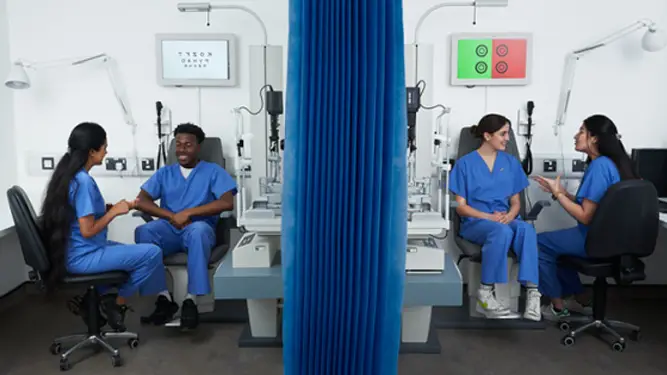
Be an Optometrist
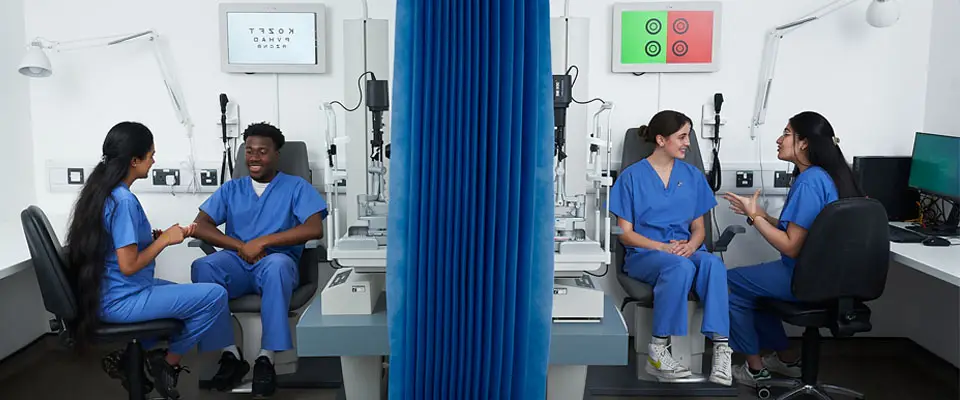
The role of an optometrist
Optometrists are healthcare specialists who are trained to examine and test the visual system, detect diseases that affect the eye and prescribe spectacles and contact lenses where necessary to correct patients’ vision.
New and innovative eye care technologies and techniques are becoming widely used in everyday optometric practice to support the clinical decision-making of optometrists, for example, using detailed imaging of the different structures of the eye. Optometrists also test vision and eye alignment and use the results of these clinical examinations to determine whether a patient requires refractive correction – most commonly by prescribing and fitting glasses or contact lenses.
In addition to this, optometrists also detect eye diseases, such as glaucoma and age-related macular degeneration, and even general health conditions like diabetes and high blood pressure.
Optometrists can manage a range of eye conditions themselves or they might refer patients to a general practitioner (GP) or other health specialist to ensure they get the right care and treatment.
Optometrists work in many settings including:
• their own independent private practice
• a community practice that may be part of a large company with multiple branches
• hospital eye clinics
• people’s homes or care homes
• teachers or researchers at universities
• in industry to develop new technologies, tools and resources to support eye examinations and care.
The role of the optometrist as part of the professional eye care team is changing and expanding, and the opportunities for a fulfilling career have never been better. For example, many optometrists are now qualified to perform minor surgical procedures, such as injections to treat age-related macular degeneration. Others are also able to prescribe drugs to treat conditions such as glaucoma.
The first step towards becoming an optometrist is studying optometry. So, if you’re keen to help people see clearly, treat conditions that affect patients’ quality of life and work with innovative technology in healthcare, then optometry is the career for you!
Study optometry at Cardiff University
Discover more about studying optometry at Cardiff University
Be an Optometrist

The role of an optometrist
Optometrists are healthcare specialists who are trained to examine and test the visual system, detect diseases that affect the eye and prescribe spectacles and contact lenses where necessary to correct patients’ vision.
New and innovative eye care technologies and techniques are becoming widely used in everyday optometric practice to support the clinical decision-making of optometrists, for example, using detailed imaging of the different structures of the eye. Optometrists also test vision and eye alignment and use the results of these clinical examinations to determine whether a patient requires refractive correction – most commonly by prescribing and fitting glasses or contact lenses.
In addition to this, optometrists also detect eye diseases, such as glaucoma and age-related macular degeneration, and even general health conditions like diabetes and high blood pressure.
Optometrists can manage a range of eye conditions themselves or they might refer patients to a general practitioner (GP) or other health specialist to ensure they get the right care and treatment.
Optometrists work in many settings including:
• their own independent private practice
• a community practice that may be part of a large company with multiple branches
• hospital eye clinics
• people’s homes or care homes
• teachers or researchers at universities
• in industry to develop new technologies, tools and resources to support eye examinations and care.
The role of the optometrist as part of the professional eye care team is changing and expanding, and the opportunities for a fulfilling career have never been better. For example, many optometrists are now qualified to perform minor surgical procedures, such as injections to treat age-related macular degeneration. Others are also able to prescribe drugs to treat conditions such as glaucoma.
The first step towards becoming an optometrist is studying optometry. So, if you’re keen to help people see clearly, treat conditions that affect patients’ quality of life and work with innovative technology in healthcare, then optometry is the career for you!
Study optometry at Cardiff University
Discover more about studying optometry at Cardiff University
Being able to see clearly plays a vital part in our overall health and wellbeing. Optometrists provide essential eye health management, care and vision correction.
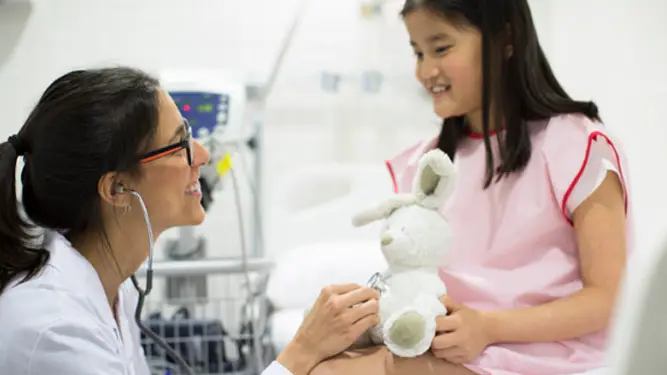
Be a Paediatrician
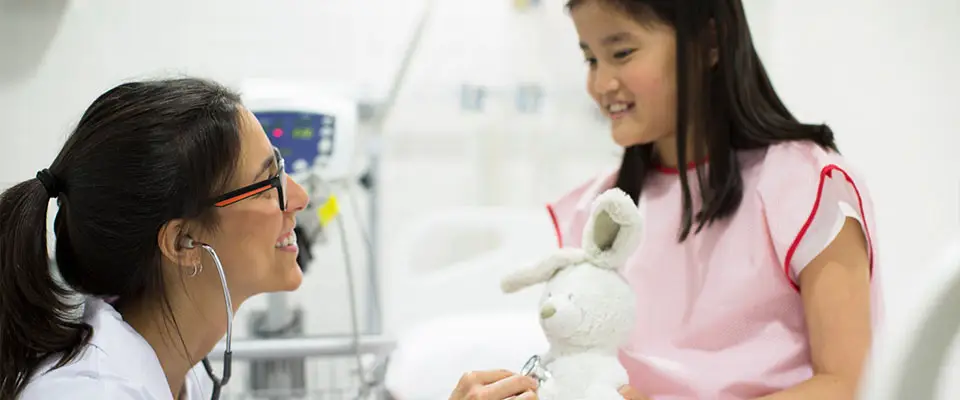
The role of a Paediatrician
The term paediatrician can cover a range of different roles – if you decide you’d like to become a doctor who works with children and young people, then you’ll likely fall into one of four main areas:
- General paediatrics – these doctors are based within hospitals, and treat children from birth until the age of 16.
- Neonatology – these are specialists who work with newly born babies, many of whom are born prematurely or have health issues or problems at birth. These doctors are mainly based in intensive care units.
- Community paediatrics – doctors based in the community, such as in GP surgeries or specialist teams. They will look after children with developmental, social or behavioural problems, and those with physical disabilities.
- Paediatric cardiology – a very specialist area. These doctors treat children with heart conditions.
Paediatrics is a very varied job – no two days are the same, and paediatricians get to work with whole families as well as individuals, which is very rewarding. Depending on their specific area, a paediatrician’s day-to-day job is likely to involve assessing children who are ill, injured or have disabilities. They need to have lots of patience, empathy and excellent communication skills – both for their patients, and for their patients’ families and carers. Being able to put a child at ease at the same time as telling their parent the information they need to know is an essential skill for a paediatric doctor.
In addition to assessing and treating children and young people, paediatricians prescribe medication, surgery or therapies, write patient notes and produce medical reports, and even supervise and train junior members of staff. It’s a varied role that requires meticulous attention to detail.
Working with children who are unwell can be a highly emotional experience and it’s a role that needs sensitivity and active listening skills, because the patient or their family may not be able to say exactly what a paediatrician needs to know to make the correct diagnosis.
If you want a career in medicine and to focus on child’s health, this could be the career for you.
The first step towards becoming a paediatrician is studying medicine. To find out more about applying to study Medicine, download our ‘Passport to Medicine’ which is jam-packed with useful information, hints and tips to help you on your way.
Study medicine at Cardiff University
Be a Paediatrician

The role of a Paediatrician
The term paediatrician can cover a range of different roles – if you decide you’d like to become a doctor who works with children and young people, then you’ll likely fall into one of four main areas:
- General paediatrics – these doctors are based within hospitals, and treat children from birth until the age of 16.
- Neonatology – these are specialists who work with newly born babies, many of whom are born prematurely or have health issues or problems at birth. These doctors are mainly based in intensive care units.
- Community paediatrics – doctors based in the community, such as in GP surgeries or specialist teams. They will look after children with developmental, social or behavioural problems, and those with physical disabilities.
- Paediatric cardiology – a very specialist area. These doctors treat children with heart conditions.
Paediatrics is a very varied job – no two days are the same, and paediatricians get to work with whole families as well as individuals, which is very rewarding. Depending on their specific area, a paediatrician’s day-to-day job is likely to involve assessing children who are ill, injured or have disabilities. They need to have lots of patience, empathy and excellent communication skills – both for their patients, and for their patients’ families and carers. Being able to put a child at ease at the same time as telling their parent the information they need to know is an essential skill for a paediatric doctor.
In addition to assessing and treating children and young people, paediatricians prescribe medication, surgery or therapies, write patient notes and produce medical reports, and even supervise and train junior members of staff. It’s a varied role that requires meticulous attention to detail.
Working with children who are unwell can be a highly emotional experience and it’s a role that needs sensitivity and active listening skills, because the patient or their family may not be able to say exactly what a paediatrician needs to know to make the correct diagnosis.
If you want a career in medicine and to focus on child’s health, this could be the career for you.
The first step towards becoming a paediatrician is studying medicine. To find out more about applying to study Medicine, download our ‘Passport to Medicine’ which is jam-packed with useful information, hints and tips to help you on your way.
Study medicine at Cardiff University
Paediatric doctors support children and young people going through a range of different health conditions, as well as liaising with their families and carers.

Be a Pharmacist

The role of a pharmacist
Pharmacists play a crucial role in keeping us all healthy – they are experts in the science and use of medicines, and the drugs contained within them.
Qualified pharmacists are clinicians who use their strong scientific knowledge to help patients overcome all sorts of health problems as they know which medicines work best to treat different illnesses, what side effects can occur, how our bodies interact with different medicines and how those medicines interact with each other within our bodies.
You probably know pharmacists best for working directly with patients when they are unwell or need advice on their medicines. As well as having this expert scientific knowledge about medicines, pharmacists also need excellent communication skills as they hold consultations to identify patients’ needs and to determine what medicines will be most effective to treat a patient’s health condition.
These pharmacists administer drugs and vaccinations, offer advice about medicines to patients and other healthcare professionals – such as doctors, nurses, physiotherapists and occupational therapists – and they support patients to care for themselves. Many prescribe medicines too, just like a doctor.
As key members of the healthcare team, pharmacists work in lots of different settings – in doctor’s surgeries, in hospitals and in pharmacies in our communities. Others work in the military, in care homes, prisons, and within mental health organisations, all with the aim of improving patient health.
There are other ways in which pharmacists can use their expert knowledge to help patients in need since some pharmacists work in laboratories where they carry out research to discover new drugs and treatments for all kinds of diseases. Others also work in labs to redevelop existing drugs to better treat a disease. And some pharmacists choose to research and test new ways of delivering drugs into our bodies using technologies such as tiny needles, aerosols, capsules or even nanoparticles so that they work more effectively for all kinds of patients with complicated health problems.
Pharmacists can also work for the companies that manufacture and distribute a whole range of medicines or in Government helping to advise on medicines approvals.
The first step towards becoming a pharmacist is studying pharmacy. So, whether you’d like to help design or develop a drug in a lab or prescribe medicine to make patients better when they’re ill, you could become a pharmacist to use your expert knowledge of medicines and health to improve patients’ lives.
Study pharmacy at Cardiff University
Discover more about studying pharmacy at Cardiff University
Find out more about applying to study Pharmacy by downloading our Passport to Pharmacy which is full of useful information.
Be a Pharmacist

The role of a pharmacist
Pharmacists play a crucial role in keeping us all healthy – they are experts in the science and use of medicines, and the drugs contained within them.
Qualified pharmacists are clinicians who use their strong scientific knowledge to help patients overcome all sorts of health problems as they know which medicines work best to treat different illnesses, what side effects can occur, how our bodies interact with different medicines and how those medicines interact with each other within our bodies.
You probably know pharmacists best for working directly with patients when they are unwell or need advice on their medicines. As well as having this expert scientific knowledge about medicines, pharmacists also need excellent communication skills as they hold consultations to identify patients’ needs and to determine what medicines will be most effective to treat a patient’s health condition.
These pharmacists administer drugs and vaccinations, offer advice about medicines to patients and other healthcare professionals – such as doctors, nurses, physiotherapists and occupational therapists – and they support patients to care for themselves. Many prescribe medicines too, just like a doctor.
As key members of the healthcare team, pharmacists work in lots of different settings – in doctor’s surgeries, in hospitals and in pharmacies in our communities. Others work in the military, in care homes, prisons, and within mental health organisations, all with the aim of improving patient health.
There are other ways in which pharmacists can use their expert knowledge to help patients in need since some pharmacists work in laboratories where they carry out research to discover new drugs and treatments for all kinds of diseases. Others also work in labs to redevelop existing drugs to better treat a disease. And some pharmacists choose to research and test new ways of delivering drugs into our bodies using technologies such as tiny needles, aerosols, capsules or even nanoparticles so that they work more effectively for all kinds of patients with complicated health problems.
Pharmacists can also work for the companies that manufacture and distribute a whole range of medicines or in Government helping to advise on medicines approvals.
The first step towards becoming a pharmacist is studying pharmacy. So, whether you’d like to help design or develop a drug in a lab or prescribe medicine to make patients better when they’re ill, you could become a pharmacist to use your expert knowledge of medicines and health to improve patients’ lives.
Study pharmacy at Cardiff University
Discover more about studying pharmacy at Cardiff University
Find out more about applying to study Pharmacy by downloading our Passport to Pharmacy which is full of useful information.
Pharmacists are experts in the science and use of medicines. They help patients overcome all sorts of health problems and some prescribe medicines too, just like a doctor.
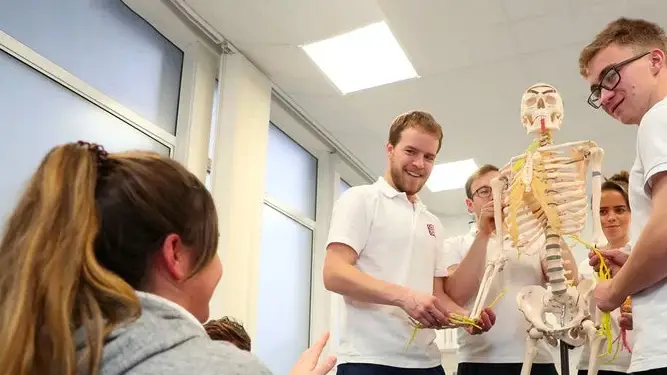
Be a Physiotherapist
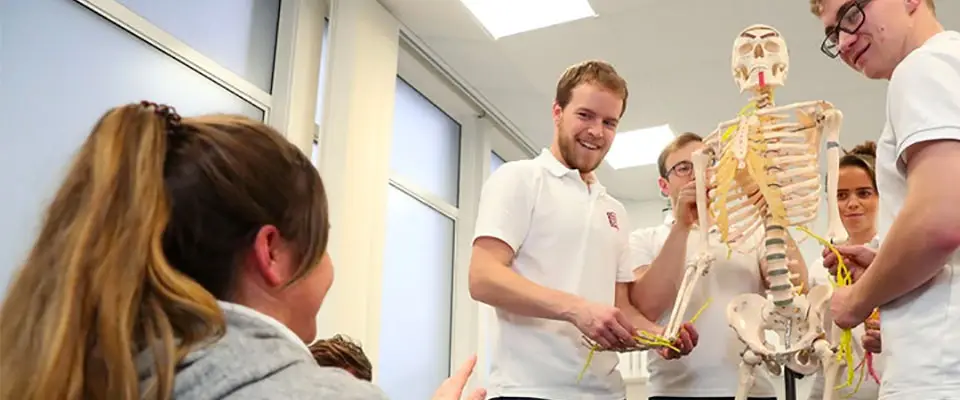
The role of a Physiotherapist
A physiotherapist helps to restore movement and function when someone is affected by injury, illness, or disability. They can also help to diagnose and reduce the risk of injury or illness in the future as they strive to give their patients the knowledge, tools, and guidance they need to get stronger and achieve their goals.
A physiotherapist will help people of all ages and cover a variety of situations – they may rehabilitate heart attack survivors, people who have been injured through an accident, or help people with multiple sclerosis. They look at the whole body and tailor treatments to focus on the individual.
That’s why you may find a physiotherapist in a hospital or in the community setting (in clinics or their own practice). Physiotherapists can also be found supporting sports teams, elite athletes, charities, and clubs. They may work alone or as part of a multi-disciplinary team but, one thing’s for sure, they have plenty of choice when it comes to career opportunities and places to work.
Working in partnership with their patients, becoming a physiotherapist is challenging but also very rewarding. So, if you follow this path, you can play a key role in enabling individuals and the public to improve their health, wellbeing, and quality of life.
Study physiotherapy at Cardiff University
Discover more about studying physiotherapy at Cardiff University
Be a Physiotherapist

The role of a Physiotherapist
A physiotherapist helps to restore movement and function when someone is affected by injury, illness, or disability. They can also help to diagnose and reduce the risk of injury or illness in the future as they strive to give their patients the knowledge, tools, and guidance they need to get stronger and achieve their goals.
A physiotherapist will help people of all ages and cover a variety of situations – they may rehabilitate heart attack survivors, people who have been injured through an accident, or help people with multiple sclerosis. They look at the whole body and tailor treatments to focus on the individual.
That’s why you may find a physiotherapist in a hospital or in the community setting (in clinics or their own practice). Physiotherapists can also be found supporting sports teams, elite athletes, charities, and clubs. They may work alone or as part of a multi-disciplinary team but, one thing’s for sure, they have plenty of choice when it comes to career opportunities and places to work.
Working in partnership with their patients, becoming a physiotherapist is challenging but also very rewarding. So, if you follow this path, you can play a key role in enabling individuals and the public to improve their health, wellbeing, and quality of life.
Study physiotherapy at Cardiff University
Discover more about studying physiotherapy at Cardiff University
A physiotherapist helps to restore movement and function when someone is affected by injury, illness, or disability. They can also help to prevent future injury or illness.
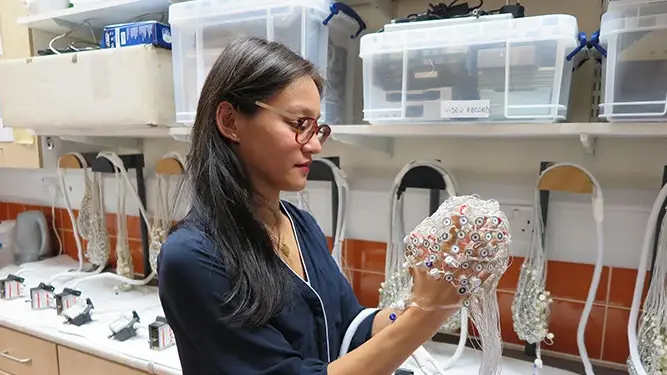
Be a Psychologist
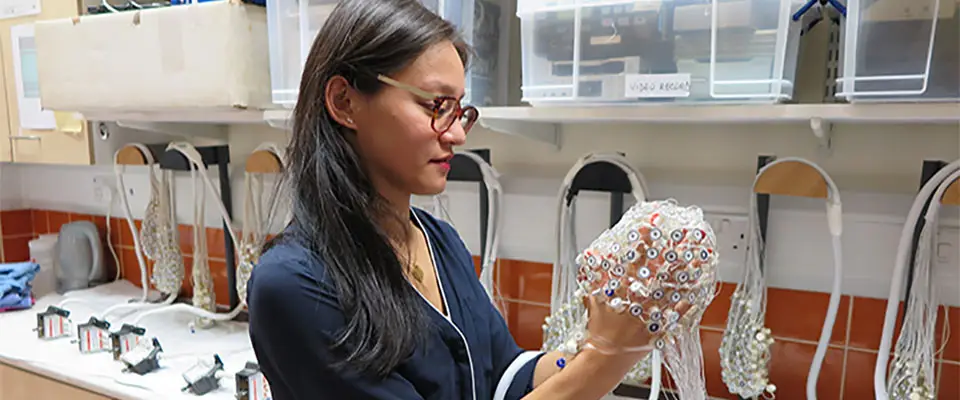
The role of a Psychologist
As experts in the workings of the mind and human behaviour, qualified psychologists can identify emotional and behavioural patterns, help to understand various mental health difficulties, devise suitable treatment plans for their patients, and refer patients to other relevant healthcare professionals.
Psychologists can enter a wide variety of careers, traditionally including clinical, health, forensic, and educational roles. For example, clinical psychologists identify, evaluate and treat the causes of mental health problems – such as anxiety, trauma or depression Health psychologists support people to understand physical illness and make behavioural changes to improve their quality of life.
Forensic psychologists provide expert evidence in the criminal justice system – including in legal courts, advising parole boards, and implementing treatment programmes. Educational psychologists improve children’s experiences of learning and provide helpful strategies and interventions to enable children to overcome their educational difficulties.
Many psychologists work directly with patients in hospitals or in other settings, such as schools, community health centres, prisons, nursing homes, or rehabilitation centres. Although these roles are exciting and rewarding in themselves, qualified psychologists are not limited to these paths.
For example, psychologists have been employed to work on public awareness campaigns to quit smoking, improve vaccine uptake and adhere to public health advice or to tackle climate change. Others have contributed to the design of new technology to help people combat anxiety or they have engaged in consumer research to analyse purchasing behaviour.
This means government departments, private companies and businesses, as well as charities, advertising agencies and many more organisations, are frequently looking to employ psychologists to help them achieve their goals.
Other psychologists choose to conduct research in their field of interest to better understand the mind and behaviour. Their findings can lead to changes in government policy or treatment plans for patients internationally.
The first step towards becoming a psychologist is studying psychology. If you are interested in people, the way our minds work, and how you can help to understand and change behaviour, you might just make a fantastic psychologist!
Study psychology at Cardiff University
Discover more about studying psychology at Cardiff University
Be a Psychologist

The role of a Psychologist
As experts in the workings of the mind and human behaviour, qualified psychologists can identify emotional and behavioural patterns, help to understand various mental health difficulties, devise suitable treatment plans for their patients, and refer patients to other relevant healthcare professionals.
Psychologists can enter a wide variety of careers, traditionally including clinical, health, forensic, and educational roles. For example, clinical psychologists identify, evaluate and treat the causes of mental health problems – such as anxiety, trauma or depression Health psychologists support people to understand physical illness and make behavioural changes to improve their quality of life.
Forensic psychologists provide expert evidence in the criminal justice system – including in legal courts, advising parole boards, and implementing treatment programmes. Educational psychologists improve children’s experiences of learning and provide helpful strategies and interventions to enable children to overcome their educational difficulties.
Many psychologists work directly with patients in hospitals or in other settings, such as schools, community health centres, prisons, nursing homes, or rehabilitation centres. Although these roles are exciting and rewarding in themselves, qualified psychologists are not limited to these paths.
For example, psychologists have been employed to work on public awareness campaigns to quit smoking, improve vaccine uptake and adhere to public health advice or to tackle climate change. Others have contributed to the design of new technology to help people combat anxiety or they have engaged in consumer research to analyse purchasing behaviour.
This means government departments, private companies and businesses, as well as charities, advertising agencies and many more organisations, are frequently looking to employ psychologists to help them achieve their goals.
Other psychologists choose to conduct research in their field of interest to better understand the mind and behaviour. Their findings can lead to changes in government policy or treatment plans for patients internationally.
The first step towards becoming a psychologist is studying psychology. If you are interested in people, the way our minds work, and how you can help to understand and change behaviour, you might just make a fantastic psychologist!
Study psychology at Cardiff University
Discover more about studying psychology at Cardiff University
Traditionally associated with mental health, psychologists are increasingly in demand in other fields which need to understand, predict, and change human behaviour.
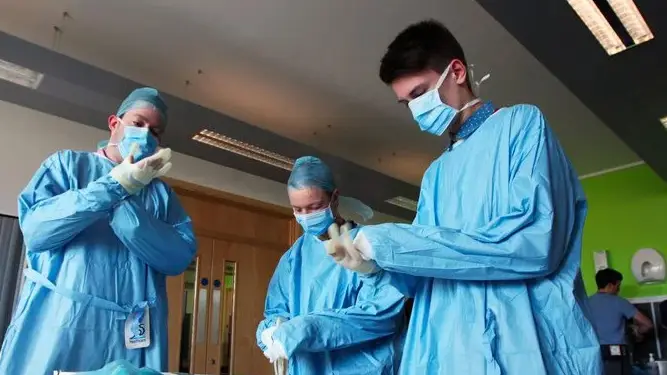
Be a Surgeon
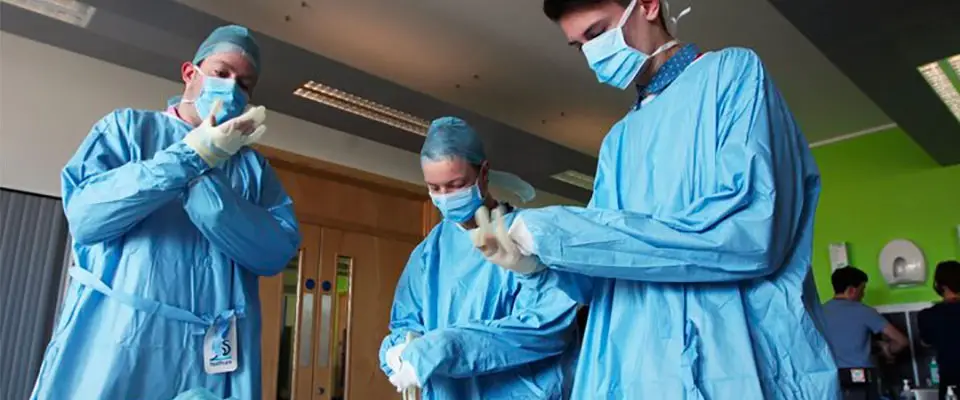
The role of a surgeon
Becoming a surgeon usually means you’ll specialise in one of ten main areas. These include:
- Cardiothoracic surgery – this means inside the chest, usually dealing with the heart and lungs
- General – this area of surgery needs a wide range of skills and knowledge to deal with lots of different surgeries, mostly to do with organs in the abdomen like the stomach, small bowel, liver, pancreas and colon.
- Neurosurgery – dealing with the nervous system. This means the brain, spinal cord and nerves.
- Ear, nose and throat (ENT) – these surgeons specialise in surgery concerning areas of the head and neck.
- Oral and maxillofacial – these surgeons treat patients with diseases and injury of the mouth, jaw, face and neck
- Paediatric – this means carrying out surgeries on premature and even unborn babies, children and young adults up to the age of 19.
- Trauma or orthopaedic – these surgeons carry out a wide range of surgical treatments on the musculoskeletal system. This also includes the supporting structures of the skeleton, such as ligaments, tendons, nerves, and muscles.
- Plastic – plastic surgery involves surgical restoration, alteration, or reconstruction. This can cover a wide range of applications, from cosmetic surgery to the treatment of burns.
- Vascular – the arteries, veins and lymphatic vessels of the body are dealt with by vascular surgeons, who focus on conditions affecting the circulation.
- Urology – these surgeons deal with disorders, diseases and injuries of the kidneys, ureter, and bladder.
Not all of the job happens in the operating theatre – surgeons also spend lots of time carrying out ward rounds and outpatient clinics, and doing administrative duties and even teaching others who want to be surgeons in future.
The job of a surgeon starts with assessing and examining their patient, to work out if an operation is necessary and what approach will work the best. They have a lot of patient contact, especially relating to monitoring preoperative and postoperative treatments, and chatting to patients and their families before surgery to reassure them. Having good people skills, being able to communicate effectively and empathetically and reflecting on what they have learned are essential skills for surgeons of all specialities.
Throughout surgical procedures, surgeons need to follow established techniques and coordinate other multidisciplinary staff in their team, such as junior doctors, nurses and operating department practitioners – getting their patient well again is a team effort. Working well with others is crucial for achieving good outcomes.
Surgeons are also expected to conduct research into surgical techniques and equipment to improve procedures and outcomes, and train other more junior members of staff too. Long hours and being ‘on-call’ are another big part of life as a surgeon.
The first step towards becoming a surgeon is studying Medicine. So, find out more about applying to study Medicine by downloading our ‘Passport to Medicine’ which is jam-packed with useful information, hints and tips to help you on your way.
Study medicine at Cardiff University
Be a Surgeon

The role of a surgeon
Becoming a surgeon usually means you’ll specialise in one of ten main areas. These include:
- Cardiothoracic surgery – this means inside the chest, usually dealing with the heart and lungs
- General – this area of surgery needs a wide range of skills and knowledge to deal with lots of different surgeries, mostly to do with organs in the abdomen like the stomach, small bowel, liver, pancreas and colon.
- Neurosurgery – dealing with the nervous system. This means the brain, spinal cord and nerves.
- Ear, nose and throat (ENT) – these surgeons specialise in surgery concerning areas of the head and neck.
- Oral and maxillofacial – these surgeons treat patients with diseases and injury of the mouth, jaw, face and neck
- Paediatric – this means carrying out surgeries on premature and even unborn babies, children and young adults up to the age of 19.
- Trauma or orthopaedic – these surgeons carry out a wide range of surgical treatments on the musculoskeletal system. This also includes the supporting structures of the skeleton, such as ligaments, tendons, nerves, and muscles.
- Plastic – plastic surgery involves surgical restoration, alteration, or reconstruction. This can cover a wide range of applications, from cosmetic surgery to the treatment of burns.
- Vascular – the arteries, veins and lymphatic vessels of the body are dealt with by vascular surgeons, who focus on conditions affecting the circulation.
- Urology – these surgeons deal with disorders, diseases and injuries of the kidneys, ureter, and bladder.
Not all of the job happens in the operating theatre – surgeons also spend lots of time carrying out ward rounds and outpatient clinics, and doing administrative duties and even teaching others who want to be surgeons in future.
The job of a surgeon starts with assessing and examining their patient, to work out if an operation is necessary and what approach will work the best. They have a lot of patient contact, especially relating to monitoring preoperative and postoperative treatments, and chatting to patients and their families before surgery to reassure them. Having good people skills, being able to communicate effectively and empathetically and reflecting on what they have learned are essential skills for surgeons of all specialities.
Throughout surgical procedures, surgeons need to follow established techniques and coordinate other multidisciplinary staff in their team, such as junior doctors, nurses and operating department practitioners – getting their patient well again is a team effort. Working well with others is crucial for achieving good outcomes.
Surgeons are also expected to conduct research into surgical techniques and equipment to improve procedures and outcomes, and train other more junior members of staff too. Long hours and being ‘on-call’ are another big part of life as a surgeon.
The first step towards becoming a surgeon is studying Medicine. So, find out more about applying to study Medicine by downloading our ‘Passport to Medicine’ which is jam-packed with useful information, hints and tips to help you on your way.
Study medicine at Cardiff University
A surgeon is specially trained to operate on patients to repair, remove, replace or assess diseased or damaged body parts.
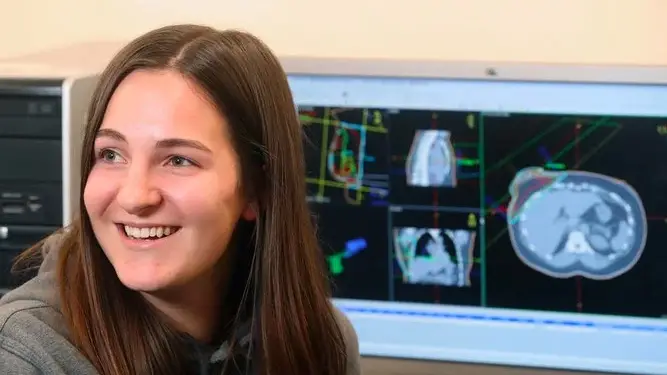
Be a Therapeutic radiographer
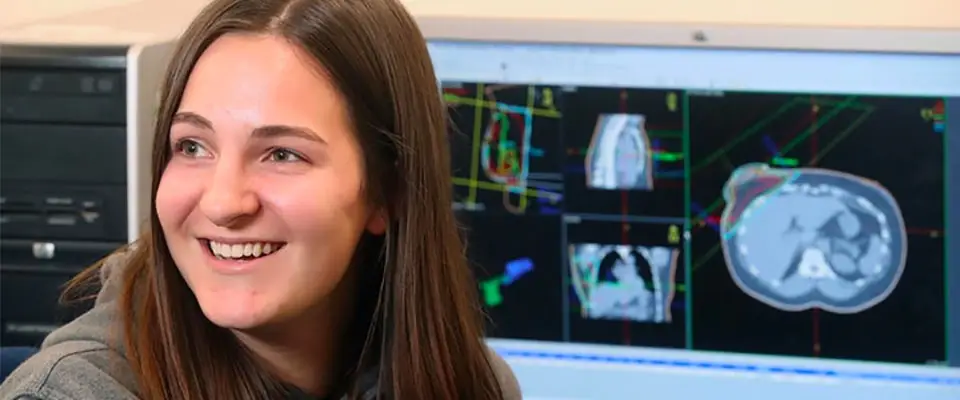
The role of a Therapeutic radiographer
Every two minutes someone in the UK is diagnosed with cancer, however cancer survival is improving and has doubled in the last 40 years in the UK, according to Cancer Research UK.
Therapeutic radiographers play an active role in fighting cancer and provide a source of hope for those who are diagnosed since radiation treatment can shrink or remove cancers and tumours using machines to deliver concentrated radiation therapy. This kind of therapy uses high-energy radiation to kill cancer cells and is one of the main methods used to treat patients with cancer. The radiation may be delivered by a machine outside the body, or it may come from radioactive material placed in the body near cancer cells. About half of all cancer patients receive some type of radiation therapy at some time during the course of their treatment.
Based in a hospital or cancer centre, therapeutic radiographers work with patients and colleagues to design treatment programmes and support patients until their treatment ends. They are the main contact person for the patient during their radiation therapy treatment and have responsibility for many aspects of their care. From taking an initial X-ray, to using a CT scanner or a linear accelerator to provide sophisticated radiation treatment, they use some of the most complex and advanced technology to treat cancers and tumours.
The radiotherapy department has a team of highly specialist radiographers covering many areas of expertise, from research to paediatrics. The specialist radiographers work as part of the multidisciplinary team to focus upon improving cancer treatment, providing a high level of expertise and the best possible patient experience. They build a strong rapport with patients and their families as they care for patients throughout each stage of treatment.
Offering a blend of science, technology, and patient-centred care – and ultimately the knowledge that you are helping to kick cancer where it hurts – this is a career to be proud of!
Study radiotherapy at Cardiff University
Discover more about studying radiotherapy at Cardiff University
Be a Therapeutic radiographer

The role of a Therapeutic radiographer
Every two minutes someone in the UK is diagnosed with cancer, however cancer survival is improving and has doubled in the last 40 years in the UK, according to Cancer Research UK.
Therapeutic radiographers play an active role in fighting cancer and provide a source of hope for those who are diagnosed since radiation treatment can shrink or remove cancers and tumours using machines to deliver concentrated radiation therapy. This kind of therapy uses high-energy radiation to kill cancer cells and is one of the main methods used to treat patients with cancer. The radiation may be delivered by a machine outside the body, or it may come from radioactive material placed in the body near cancer cells. About half of all cancer patients receive some type of radiation therapy at some time during the course of their treatment.
Based in a hospital or cancer centre, therapeutic radiographers work with patients and colleagues to design treatment programmes and support patients until their treatment ends. They are the main contact person for the patient during their radiation therapy treatment and have responsibility for many aspects of their care. From taking an initial X-ray, to using a CT scanner or a linear accelerator to provide sophisticated radiation treatment, they use some of the most complex and advanced technology to treat cancers and tumours.
The radiotherapy department has a team of highly specialist radiographers covering many areas of expertise, from research to paediatrics. The specialist radiographers work as part of the multidisciplinary team to focus upon improving cancer treatment, providing a high level of expertise and the best possible patient experience. They build a strong rapport with patients and their families as they care for patients throughout each stage of treatment.
Offering a blend of science, technology, and patient-centred care – and ultimately the knowledge that you are helping to kick cancer where it hurts – this is a career to be proud of!
Study radiotherapy at Cardiff University
Discover more about studying radiotherapy at Cardiff University
A physiotherapist helps to restore movement and function when someone is affected by injury, illness, or disability. They can also help to prevent future injury or illness.
Browse our subjects
Cardiff University is proud to offer an extensive range of degree programmes to kickstart your career in health.